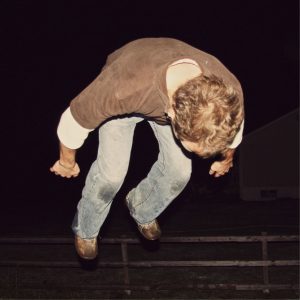Just as two teenagers would, Jonathan Dauphinais and Steve Dumas can spend countless hours talking about the music of the ’90s and imagining – this is just one of many examples – what Weezer might have become had bassist Matt Sharp not left the band in February of 1998.
Dauphinais flashes a smile to his friend and says, “Remember when we went and talked to Matt Sharp after the Rentals show?” That was in May of 2015, at Montréal’s Fairmount Theater. “You told him, talking about me, something like, ‘This guy, he’s one of the best bass players in North America.’ I was so embarrassed.”
It’s clear, despite the prosperity of their respective careers, that Steve Dumas (better known under his last name only) and Jonathan Dauphinais (who’s collaborated with Beast, Ariane Moffatt, Milk & Bone, and creates electro under the name Hoodies at Night) are, first and foremost, bona fide music lovers.
 In this spirit, they were supposed to celebrate Dauphinais’ 40th Birthday by booking a recording session at Electric Studio in Chicago, headquarters of Steve Albini—who produced Nirvana’s In Utero, among other notable projects. He’s one of the most influential sound architects of the ‘90s, an authentic living legend who advocates a radical vision of studio work. It’s the antithesis of a world where all re-touching is now allowed. Albini is also very open to receiving just about anyone in his home.
In this spirit, they were supposed to celebrate Dauphinais’ 40th Birthday by booking a recording session at Electric Studio in Chicago, headquarters of Steve Albini—who produced Nirvana’s In Utero, among other notable projects. He’s one of the most influential sound architects of the ‘90s, an authentic living legend who advocates a radical vision of studio work. It’s the antithesis of a world where all re-touching is now allowed. Albini is also very open to receiving just about anyone in his home.
“If we got a band together with a tuba, a trombone and a tap dancer, and we were game to go record there, on tape, he’d book us,” Dauphinais says of Albini. “One e-mail and your session is booked, and it’s not expensive. He puts on his lab coat, places his mics, and presses record. All he wants is for people to make as much noise as possible, and then leave with their reel of tape.”
For several months, Dumas, Dauphinais, and drummer Francis Mineau (of Malajube) prepared for their Chicago visit in their rehearsal space where they improvised endlessly before choosing the best material to come out of those jam sessions, This was the raw material from which they elaborated the instrumental repertoire. that they would have immortalized over the course of a few days spent at Albini’s, starting on March 19, 2020. That never happened, for the viral reasons we all know.
Upon hearing a home recording of these songs, filmmaker Louis-Philippe Eno (one of Dumas’ close collaborators) convinced the trio to make them into an album, even without Albini. In fact, a photo taken by Eno more than 20 years ago, at a party in Victoriaville, adorns the album cover. It’s a young man suspended in mid-air, apparently doing a rather funny somersault. “Still. to this day, we have no idea how he ended up in that position,” Dumas chuckles.
Although entirely instrumental, the supergroup’s first album – “We hate the term ‘supergroup’” – follows a precise narrative: the story of a young musician in his late teens who was there during the August 8, 1992, riot at the Olympic Stadium provoked by Axl Rose deserting the stage. An event that would be the last nail in the coffin of hair metal, which was already on its knees following the uppercut of Nirvana’s Nervermind.
“It’s pretty much our own story: a young man growing up in a rural town, with passions like playing Nintendo and riding his bike, until music comes into his life,” explains Francis Mineau, who penned a series of allusive poems included on the album cover, a sort of hole-in-the-wall version of the story of their grunge hero.
Although the drummer and writer is originally from Saint-Hugues, Québec, near Sorel, it’s the Bois-Francs and Centre-du-Québec regions that are the setting for the adventures of their alter ego (Dauphinais is from Drummondville, and Dumas from Victoriaville). For this instrumental project, Dumas is happy to go back to the role of simple guitarist within AXLAUSTADE, a task he used to perform in his very first skate-punk band, The Slug.
“When you’re a teenager and you start a band in a place like Saint-Hugues, Victo, or Drummond, you inevitably think that the ideal world is elsewhere. It’s in Seattle, London, or Halifax. It’s everywhere except the place you were born,” says Dumas. Their protagonist gradually understands, as they did, that there’s nothing more powerful than celebrating where you come from. The poems accompanying AXLAUSTADE are full of references to villages like Tingwick and Wickham, along with nods to prominent figures from the decade before the millennium. And the song titled “oui no na”? Obviously, it’s a tribute to Winona Ryder, the star of Reality Bites (1994).
Imagined in part as an alternative to those who like instrumental music but want something more than a solo piano, AXLAUSTADE is also proof that it’s possible to go through our thirties without leaving behind either the fervour of musical curiosity that animated us in our teens, or the desire to create for the sake of creating, for the beauty of the gesture, and for the camaraderie. In this regard, AXLAUSTADE is anything but a nostalgia project.
“I believe it’s a choice you have to make. The point came when we decided to put in the necessary hours,” says Dumas, who has a son, while his colleagues both have three kids each. “You have to put in those hours so you don’t lose that passion, and you don’t forget the kid inside of us, who gives us that drive.”